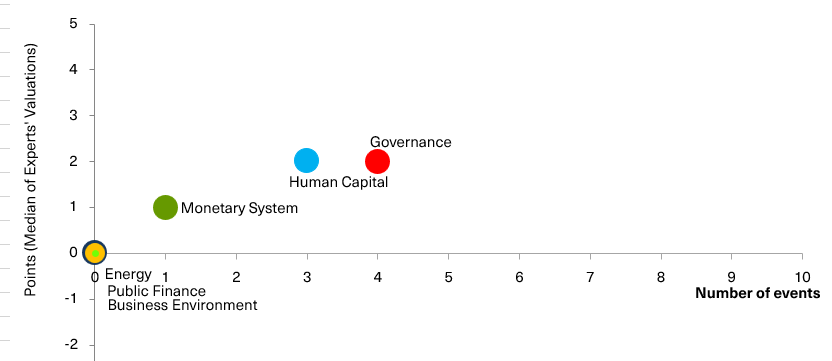The Reform Index’s 227th issue covers the period from December 4 to 17. It incorporates eight reforms contributing to progress in three of the six observed areas – Public Governance, Monetary System, and Human Capital. Overall, the Index scored +0.8 points (on a scale ranging from -5 to +5). In the previous issue, it was slightly higher, at +1 point.
Graph 1. Dynamics of the Reform Index
Graph 2. Values of the Reform Index and its Components in the Current Assessment Round
Amendments to the law on national minorities (communities) regarding television quotas and language of education, +2 points
Ukraine continues to make changes to the legislation concerning national communities, the adoption of which was one of the conditions for starting negotiations on EU accession. Law 3504-IX expands the possibilities of using the languages of national communities in the educational and media environment.
National minorities whose languages belong to the official languages of the EU are now allowed to receive basic and specialized secondary education in their native language, alongside studying integrated courses in Ukrainian language, literature, Ukrainian history, and Ukraine’s defense. Private higher education institutions are also permitted to organize the educational process in the official languages of the EU, provided that the Ukrainian language is taught as a separate discipline.
Furthermore, lawmakers have made clarifications to the law on national minorities (communities) regarding which populated areas can be considered as traditionally inhabited by representatives of national minorities. These are settlements where representatives of a national minority have lived for at least 100 years and constitute no less than 10% of the population (this norm does not apply if the community has experienced deportation or genocide based on nationality or has left the place of residence due to armed conflict or occupation). Alternatively, it includes populated areas where over 15% of the population consists of representatives of a national minority. In such settlements, it is allowed to distribute advertising and election materials in the languages of indigenous peoples and national minorities (provided that they are duplicated/subtitled in Ukrainian).
Information about the Reforms Index project, the list of Index experts and the database of the regulations assessed are available here.
The law on strengthening the independence of the Specialized Anti-Corruption Prosecutor’s Office (SAP), +2 points
Government Law 3509-IX, adopted and signed in December, increases the autonomy of the Specialized Anti-Corruption Prosecutor’s Office and changes several provisions related to the duration of investigations.
The most significant change is granting separate legal entity status to the SAP. This allows the Specialized Anti-Corruption Prosecutor’s Office to have its own property and accounts in the treasury and independently determine its structure and staff.
The new law grants the Deputy Prosecutor General — Head of the SAP access to state secrets of all levels of secrecy.
Additionally, there are some changes in the approach to determining timeframes in the conduct of cases: the pre-trial investigation period is now calculated from the moment a person is informed of suspicion (previously, it was from the moment of registration in the Unified Register of Pre-trial Investigations). Furthermore, the provision that allowed for the closure of a case due to the expiration of the pre-trial investigation period in a criminal proceeding where a person was not informed of suspicion has been abolished.
The European Business Association believes that these provisions carry the risk of putting pressure on businesses because they do not limit the timeframe for conducting covert investigative actions, gaining access to accounts, and other measures during the pre-trial investigation — before notifying the person of suspicion. At the same time, before being informed of suspicion, a person does not have legal grounds to familiarize themselves with the case materials or respond to the SAP’s actions.
Changes to the law on corruption prevention regarding assets acquired prior to appointment to public service, +0.75 points
Law 3503-IX is another step in strengthening anti-corruption legislation and the capacity of anti-corruption agencies. It allows the National Agency on Corruption Prevention (NACP) to verify the sources of property acquired by a public official or their family members before the obligation to file a declaration arises.
The list of individuals required to submit declarations is specified in the Law on Prevention of Corruption.
Chart 3. Value of Reform Index components and number of events
Reform Index from VoxUkraine aims to provide a comprehensive assessment of reform efforts by Ukraine’s authorities. The Index is based on expert assessments of changes in the regulatory environment in six areas: Governance, Public Finance, Monetary system, Business Environment, Energy, Human Capital.
Attention
The author doesn`t work for, consult to, own shares in or receive funding from any company or organization that would benefit from this article, and have no relevant affiliations






